When I buy meat in bulk or have an animal slaughtered…
How Much Eating Meat Will I Get?
There’s no exact answer to this question!
See, each animal is built differently. Animals, like people, come in varying shapes and sizes, even when from the same gene pool. They differ in build and size, even when breeding rare and heritage strains. One may have a higher fat to muscle ratio. One may have naturally leaner tissue. One may have a more dense bone mass.
Then, there’s the butchering. Cutting preference will always impact quantity, and in many ways can affect quality. We like our meat trimmed minimally to leave the good stuff on. Supermarkets trim lean. We like our fat left on. Some butchers will remove and discard this natural flavour enhancer. Then, there’s the whole bone-in or bone-out issue, which will make a lot of difference to just how much meat you can fit into your freezer.
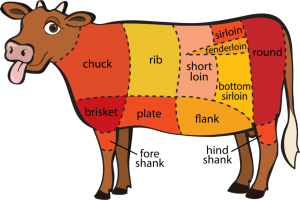
Do I pay for the weight of the cow before or after slaughter?
After.
Slaughtering the cow removes the head, tail, organs, blood, hide, and any inedible parts from the animal. In beef and lamb, this can be a loss of around 40% of the beasts body weight. In pork and game, it accounts for around 25-30%.
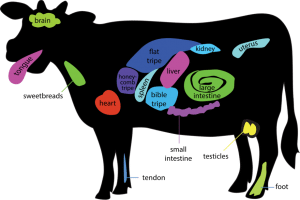
[dropshadowbox align=”none” effect=”lifted-both” width=”auto” height=”” background_color=”#ffffff” border_width=”1″ border_color=”#dddddd” ]Example: If your yearling weighs 500 kg live weight, it will most likely weigh 290-324 kg when slaughtered – or ‘dressed’. This is 58-60% of the live weight. [/dropshadowbox]
After slaughter, the carcass will weigh considerably less than before. The percentage remaining can be estimated:
Beef 58% – 65%
Veal 58% – 64%
Pork 73% – 75%
Lamb 48% – 52%
Do I pay for the weight of the cow before or after dressing?
Before. Sort of.
After slaughtering, or ‘dressing’, comes the processing or butchering. This is the cutting of the dressed carcass meat into ready to cook portions such as steaks, roasts, etc. This accounts for another loss in weight as excess fat and bones are trimmed away. The more fat and bone trimmed away, the greater the loss of weight.
The fatter the carcass, the lower the final weight of the ready to cook packed meats will be.
- When we sell beef, we provide you with all the trim, minced (no additives) and all the bones. You can take as much or as little of the bone as you wish.
- When we sell you lamb, mutton, or hogget, we don’t get all the bones unless you ask – sheep bones are strong in flavour and often not utilised. Let us know if you want them.
- When we sell you Saltbush, it comes very trimmed – we have no control over that.
- When we sell you pork or game, we supply you with what the butcher supplies us with and no less.
After processing, your table-ready meat will weigh less than the carcass did before processing. The percentages of closely-trimmed, mostly boneless cuts remaining from dressed weight can be estimated:
Beef 50% – 65%
Veal 65% – 75%
Pork 60% – 75%
Lamb 45% – 60%
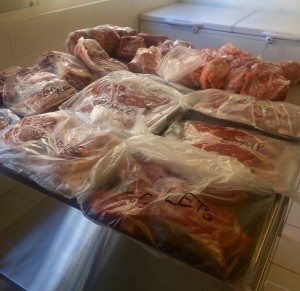
So, can you give me a rough idea of how much meat I will get?
Yes. Sort of. (There we go again).
Whole beast (average 120-150kg)
Half beast (full fore and hindquarter – average 60-65 kg)
Equal quarter beast (A little from fore and hindquarter – average 30-37 kg)
Here’s a little video we made on delivery day in May 2016, so you can see just what you get for your dollar.
Ready to order? Order Now
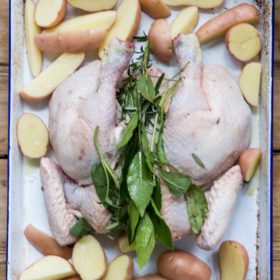
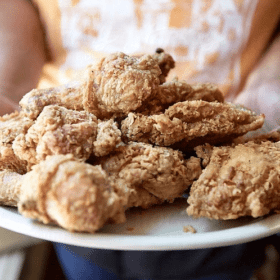

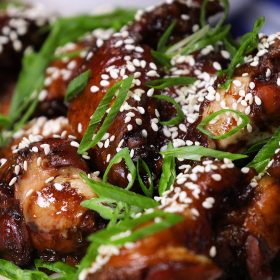
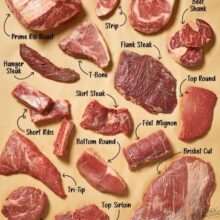

I’ve heard that the meat would be tastier than Supermarket stuff & that you get value too, so I’m keen to learn more especially how your prices compare.
Craig
Cheers Craig. If I can help you with anything, let me know. ~ Shirley
Wow, we get only a small amount of deboned meat compared to live animal